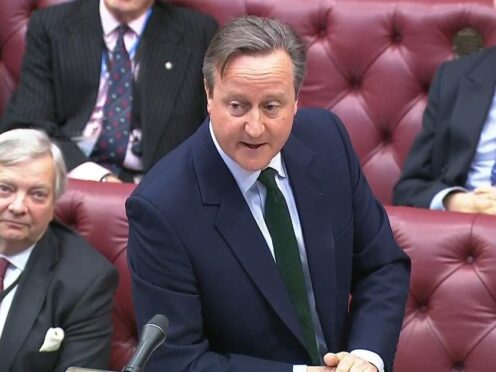
Lord Cameron must answer questions directly from MPs about turmoil across the globe, or risk appearing to hold the elected Commons in disregard, ministers have heard.
The Foreign Secretary, who sits in the House of Lords, faces regular scrutiny from peers about Russia’s invasion of Ukraine, the conflict in Gaza, and other international issues.
But MPs from across the Commons have called for him to answer questions directly from them, the elected House of Parliament, rather than unelected peers.
George Galloway, the MP for Rochdale, told the Commons: “War everywhere. Foreign Secretary nowhere. Nowhere at least that he can be questioned by the people in this country who are elected to question him.
“That is the point. It is our duty to hold ministers to account, but by definition in this situation, we cannot.”

While Mr Galloway, who represents the Workers Party of Britain, said he did not doubt Lord Cameron’s diplomatic skills, he added: “Our problem is as a country – who are forever lecturing other people on the quality of their democracy – now have an unelected head of state, an unelected Prime Minister, and an unelected Foreign Secretary, the second most important piece on the Treasury bench.”
The Commons Procedure Committee has proposed several ways in which MPs could question Lord Cameron, including via a special committee.
A report by the cross-party group of MPs also suggested he could be called to the bar of the House, a line beyond which only MPs are supposed to cross, to answer questions.
SNP MP Patrick Grady (Glasgow North), a member of the committee, told MPs it was “particularly important” that the Foreign Secretary answered questions from the elected chamber because “we are living through times of significant global turmoil”.
Mr Grady, who led an adjournment debate on the issue, added: “The Government can make it happen or the Government can choose not to make it happen.
“By choosing not to make it happen, it will be sending a message about exactly what kind of regards it holds for this House, for the mandate we have for our constituents, and therefore for our constituents themselves.”
Rachael Maskell, Labour MP for York Central, said: “Clearly our constituents are writing to us at this time about the really challenging situation we are seeing in Gaza and clearly want answers from the person that is making decisions.
“The fact there is a lack of accountability in the system when there could be war crimes being committed, not least by our own country in trading arms.
“It is absolutely right that we should have the opportunity to scrutinise.”

Conservative MP Nigel Mills (Amber Valley) warned ministers current arrangements were not a “tolerable situation for the elected House to be placed in.”
He added: “I think all the options we have here are terrible, but this was not the starting point of the committee or the House, this was the position we were put in by the Government and we were trying to find the least bad way of fixing it.”
Cabinet Office minister Alex Burghart insisted Lord Cameron was being held to account despite not being able to be directly questioned by MPs.
He told the Commons: “The Government is considering the report of the procedure committee, a very good and serious report that looked into this, if not anomalous situation because it’s arisen before, a situation that it’s quite right that we consider in a modern light.”
Mr Burghart said that Foreign Office minister Andrew Mitchell, who acts as a deputy for Lord Cameron in the Commons, “knows the Foreign Secretary’s mind.”
The minister went on to say that MPs could write to the Foreign Secretary or invite him to come to the House of Commons, but if they were looking for something “more routine” they would have to wait until the Government published its response to the procedure committee report.

Enjoy the convenience of having The Sunday Post delivered as a digital ePaper straight to your smartphone, tablet or computer.
Subscribe for only £5.49 a month and enjoy all the benefits of the printed paper as a digital replica.
Subscribe